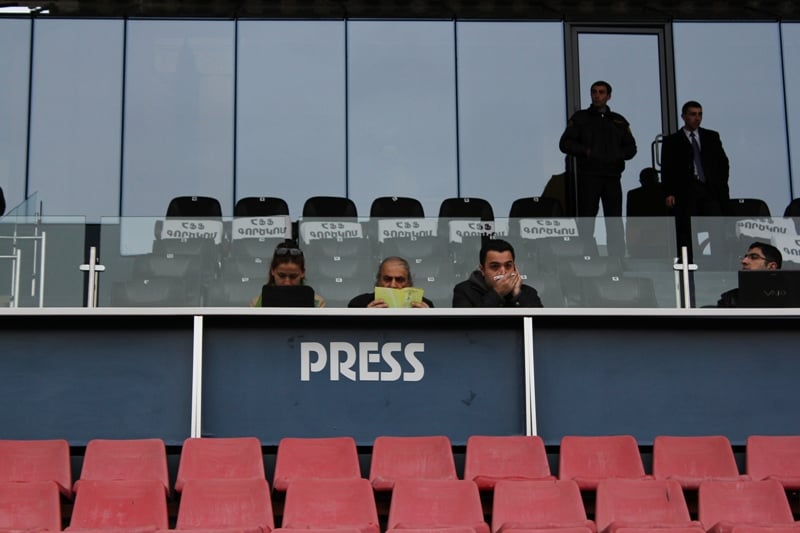Football clubs’ obligations are stipulated by Article 13 of the Football Federation of Armenia’s 2017–2018 RA Professional Football Clubs’ Tournaments Regulations, according to which clubs are obliged “immediately after each match to ensure their teams’ head coaches (or acting head coaches) participate at an organized press conference or briefing.”
This is perhaps the only fixed clause between Armenia’s football clubs and media outlets and journalists.
By the way, this is the minimum that exists in international practice. In stronger championships and tournaments, coaches and footballers are obliged to participate also in a pre-match press conference, answer journalists’ questions at the “mixed zone” after the match, and so on.
The clubs–media outlets connection is mutually beneficial: the clubs secure their public relations, and media outlets are able to provide necessary information to their readers. This is international football’s unquestionable element, which, unfortunately, has its nuances in Armenia.
Armenia is a unique country; our football championship and its coverage are also unique. We’re the only country with only six clubs in its Premier League (FC Alashkert, FC Gandzasar-Kapan, FC Shirak, FC Pyunik, FC Banants, FC Ararat), and these six clubs’ replacements with an additional four teams (Lori, Artsakh, Erebuni, Avan Academy) in the First League.
In general, there are 10 football clubs currently in Armenia. All the clubs in the Premier League, as well as Lori and Artsakh, have quite active Facebook pages. The Premier League teams, with the exception of FC Gandzasar-Kapan, also have websites (FC Pyunik’s website, however, has been down since September).
Armenian football clubs’ press secretaries are mostly media representatives, working journalists, or even editors, which in other countries would lead to conflicts of interest.
But here too Armenia is distinguished by its uniqueness: the press secretary/journalists generally present and record the facts — without discussions or expressing their own views, or praise or criticism of the other teams’ play; consequently, there can’t be a conflict of interest.
Armenia’s championship is presented to the public mainly through the eyes of the press secretary/journalists, naturally from a perspective that’s beneficial for the clubs, and media outlets accept this fact quietly.
On this harmonious “media outlets–football clubs” backdrop, in any case it’s interesting to see our teams’ play, even their daily routines, through the eyes of the club’s employees.
In particular, from the most active website, FC Banants’, we are informed that besides preparing for the matches, the footballers have a routine full of various public events: they go sightseeing in Yerevan, celebrate almost all the state and religious holidays together, go to the movies, play water polo, and so on.
From Pyunik’s site it appears that the football club doesn’t have a management: in any case, the “management” section of the website is empty.
At the same time, it must be noted that it is because of the clubs’ press secretaries’ efforts that Armenia’s championship today has become accessible to some extent — mostly for people with access to the internet.
The Football Federation of Armenia (FFA) together with V Sport and VivaroNews has begun to broadcast the Premier League teams’ matches on its YouTube channel.
FC Banants, Artsakh, FC Gandzasar-Kapan, and FC Pyunik on their YouTube channels likewise stream their matches live. With FC Shirak’s request, Shirak regional television broadcasts its matches.
In addition, the commentators of these matches online are mainly the clubs’ employees; filmed are also the coaches’ comments and sometimes also the footballers’ post-match comments are uploaded.
Journalists are sporadically present at the coaches’ post-match press conferences.
The press conference reaches media outlets mainly through video shot by the clubs’ press secretaries and, it seems, the article in the FFA’s regulations on post-match press conferences being mandatory is already lost.
Moreover, in Armenian football, particularly in FC Pyunik, talk of accepting “Russian as a mother tongue” is already given a lot of space: during the team coach’s post-match press conferences, the questions and answers are exclusively in Russian — without Armenian translation.
I noted that with the exception of FC Shirak’s matches, the Armenian championship’s matches can be seen exclusively online; moreover, purely in terms of statistics, we get quite an interesting picture.
In particular, the online broadcasts of the Armenian Premier League’s latest three matches produced the following statistics:
FC Ararat – FC Shirak (according to official figures, there were 300 spectators in the stadium)
Shirak TV’s broadcast: 2,900 views
FC Pyunik – FC Alashkert (300 spectators)
FFA’s broadcast: 3,301 views
FC Pyunik’s broadcast: 1,779 views
FC Gandzasar-Kapan – FC Banants (400 spectators)
FFA’s broadcast: 1,295 views
FC Gandzasar-Kapan’s broadcast: 2,077 views
Years ago, when I asked one of my colleagues when he’s going to the stadium (Armenia’s national team was playing), he answered quite confidently that there’s no need to go to the stadium: they’re going to show the match, and he will watch it comfortably at home and write the results of the match faster than everyone else.
I was quite surprised that football could be reported this way. But now it seems such reporting has become ubiquitous.
Of course, there are 1–2 media outlets that present their own point of view, but, in general, Armenian football and its championship reaches spectators through the internet and mainly through the club’s “eyes.”
Armen Nikoghosyan







